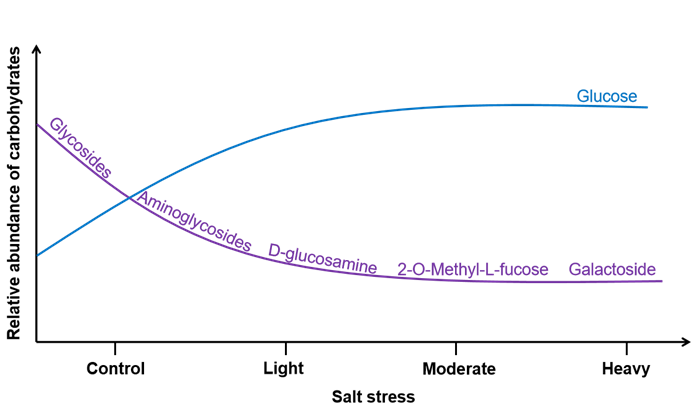

Effect of Salt Stress on Carbohydrate Secretion by the Root System of Thinopyrum ponticum
1College of Grassland Science, Shanxi Agricultural University, Taigu, Shanxi Province 030801, China; 2Shanxi Key Laboratory of Grassland Ecological Protection and Native Grass Germplasm Innovation, Taigu, Shanxi Province 030801, China; 3Youyu Loess Plateau Grassland Ecosystem National Research Station, Youyu, Shanxi Province 037200, China
Received date: 2025-03-24
Revised date: 2025-08-07
Online published: 2025-09-05
INTRODUCTION: The carbohydrates secreted by plant roots play a crucial role in modulating the carbon source supply and metabolic activity of soil microorganisms.
RATIONALE: In order to unveil the response mechanism of root-secreted carbohydrates in salt-tolerant plants to the intensity of salt stress, this study focused on the salt-tolerant forage grass Thinopyrum ponticum. Four levels of salt stress intensity were conducted by adding NaCl, including control, light, moderate, and severe stress conditions (with soil salt contents of 0%, 0.2%, 0.4%, and 0.6% respectively). Untargeted metabolomics techniques were employed to analyze the compositional alterations of root-secreted carbohydrates and their correlations with the rhizosphere soil properties were evaluated.
RESULTS: The results demonstrated that: (1) Compared to the control, salt stress significantly decreased the contents of five types of carbohydrates, namely glycosides, aminoglycosides, D-glucosamine, 2-O-Methyl-L-fucose and galactoside, while markedly increasing glucose content; (2) Glycosides were the predominant carbohydrates secreted by Thinopyrum ponticum roots, accounting for 79.63% ± 8.19% of the total relative abundance, whereas the remaining five carbohydrate types ranged from 3.40% ± 0.53% to 4.57% ± 1.61%; (3) Root-secreted carbohydrates exhibited significant differences between the control and mild, moderate, or severe salt stress treatments, but no significant distinctions were observed among the latter three treatments; (4) Soil electrical conductivity and nitrate nitrogen content were identified as key factors responsible for the down-regulation of the five carbohydrate types, while soil pH was the primary factor driving the up-regulation of glucose.
CONCLUSION: Thinopyrum ponticum can adapt to salt-stressed environments by regulating the content of carbohydrates secreted by its roots. Meanwhile, the abundance of carbohydrates secreted by the roots is also influenced by the soil properties.

Conceptual map of the influence of salt stress on carbohydrate secretion by the roots of Thinopyrum ponticum
Key words: Salinization; Root exudates; Thinopyrum ponticum; Carbohydrate
YI Cong-Cong
,
LI Dan
,
LI Pan-Jia
,
LIN Xiu-Wen
,
LV Yang-Shuai
,
CHEN Xiao-Peng
.
Effect of Salt Stress on Carbohydrate Secretion by the Root System of Thinopyrum ponticum[J]. Chinese Bulletin of Botany, 0
/
| 〈 |
|
〉 |